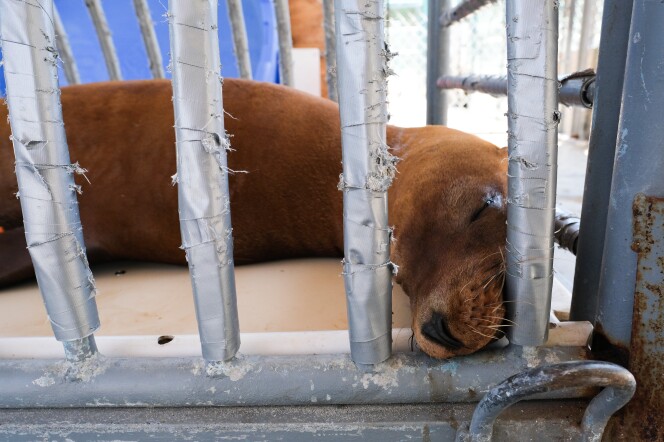This story is free to read because readers choose to support LAist. If you find value in independent local reporting, make a donation to power our newsroom today.
You’ll see a warning if you file a complaint against the LAPD. Does that chill free speech?

In 1991, in the months after four Los Angeles Police Department officers were filmed beating motorist Rodney King, a number of California cities created easier pathways for the public to file complaints about police officers.
About this article
This article was originally published by CalMatters. Sign up for their newsletters.
But the Legislature was concerned with “less ethical citizens (who would) maliciously file false allegations of misconduct against officers in an effort to punish them for simply doing their jobs,” according to a federal court decision years later.
So the Legislature instituted a new requirement: Anyone filing a complaint against an officer could face criminal charges if they knowingly signed a false report.
At the LAPD, officials went further, demanding that complainants affirm, in bold font and all capital letters, that they understand the potential penalties.
"It is against the law to make a complaint that you know to be false," the LAPD form reads in all caps. "If you make a complaint against an officer knowing that it is false, you can be prosecuted on a misdemeanor charge."
More than 30 years later, the city and the union representing its police officers are still fighting over that language, and the argument has reached the California Supreme Court.
The city of Los Angeles says the warning is a deterrent to people who would otherwise file a complaint, and violates the First Amendment by chilling free speech. The city also asserts that the form constitutes “viewpoint discrimination” — that is, it punishes false complaints against police officers, but not false statements made by police officers or witnesses in the same situation.
The Los Angeles Police Protective League, the union representing LAPD officers, argues the form is constitutional and necessary to prevent false complaints that would tie up an officer’s career.
The LAPD was under a consent decree with the U.S. Justice Department from 2001 to 2013. During that time, people could make complaints anonymously, either in-person, by phone, by mail, by fax or in an email. They would not be compelled to sign anything.
But in 2017, four years after the consent decree ended, the police officers’ union filed a lawsuit that demanded the reinstatement of the signed complaint form.
The matter went to both state and federal courts. The California courts mostly agreed with the officers’ union. The 9th U.S. Circuit Court of Appeals mostly agreed with the city.
This, the city said in a brief filed with the California Supreme Court, left it in an “impossible position” where it had to violate one court’s decision to enforce the other decisions.
“Guidance from this court is urgently needed,” city attorneys wrote in their petition.
The majority of California Supreme Court justices appeared to take a dim view of the city’s argument that the warning is unconstitutional. Associate Justice Goodwin Liu said other, similar warnings are a rote part of the justice system.
“Do perjury laws deter witnesses?” he asked a lawyer for the city of Los Angeles, referring to the law that prohibits people from lying under oath.
The lawyer, Michael Walsh, responded that other factors like negative publicity could deter witnesses from coming forward, but Liu replied that that’s not the fault or issue of the perjury laws.
The California Supreme Court justices also posed hypotheticals. What if, Associate Justice Joshua Groban asked, a person complained to the LAPD that an officer did not refer to them politely. That, he said, could be a truthful complaint, but the conduct isn’t a violation of LAPD rules — could that complainant be prosecuted?
No, said police union lawyer Michael Morguess.
“If the person utterly believes this to be true, then it can’t knowingly be false,” Morguess said.
“I think the statute needs to be crystal clear,” Groban said. “If it’s not, we’ve got a real chilling problem.”
Other arguments from the city of Los Angeles focused on that potential chilling effect.
“It takes enormous bravery for Californians who have experienced police misconduct to go forward and speak truth to power,” said Matt Nguyen, a lawyer representing a coalition of groups that filed friend-of-the-court briefs in support of the city of Los Angeles. “And yet when they go to do so, every single member of the public is forced to confront this all-caps warning that virtually screams at them.”
Liu interrupted, questioning whether that argument held water.
“Even if that is the case,” he said, “is that very discouraging, do you think?”
A ruling from the Supreme Court is expected sometime this year.
This article was originally published by CalMatters and was republished under the Creative Commons Attribution-NonCommercial-NoDerivatives license.
-
Forget the high-priced festivals. You can regularly see bands in L.A. for under $30, often for $10 or less.
-
Talks between 14,000 workers and hotel operators in SoCal have fallen through.
-
Marine mammal treatment centers are overwhelmed by sick sea lions, likely due to a toxic algal bloom off of the Southern California coast.
-
The Titanic director made 33 dives to the shipwreck and visited ocean depths in a submersible he built himself. He compares OceanGate to the Titanic, in that both ignored safety warnings.
-
Recent attacks by people who professed white nationalist and neo-Nazi sympathies but are not white themselves have raised a question: Why are some people of color drawn to white supremacist ideology? The answer is complicated.
-
The last time one of the animals was seen in California was in 2008, and prior to that the most recent sighting occurred in 1922.















